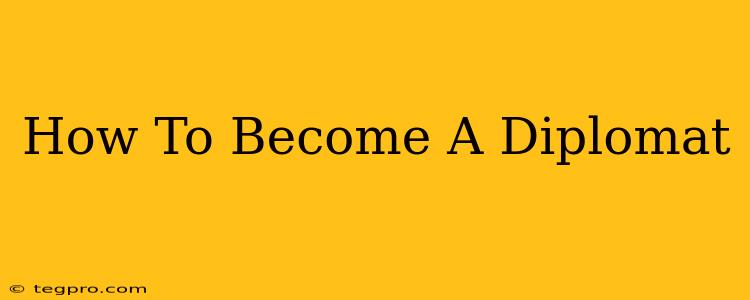A career in diplomacy offers a unique blend of intellectual stimulation, international travel, and the chance to contribute to global peace and understanding. But becoming a diplomat isn't a simple path; it requires dedication, hard work, and a specific set of skills and qualifications. This comprehensive guide will walk you through the essential steps to pursue this rewarding career.
Essential Qualifications for a Diplomatic Career
Before diving into the specifics, it's crucial to understand the fundamental requirements for a successful diplomatic career. These include:
-
Excellent Academic Record: A strong academic background is paramount. A bachelor's degree is the minimum requirement, but a master's degree in international relations, political science, economics, or a related field significantly enhances your prospects. High GPAs demonstrate commitment and intellectual capacity.
-
Foreign Language Proficiency: Fluency in at least one foreign language is highly desirable, and often mandatory. The more languages you speak, the more valuable you become. Proficiency in languages commonly used in international relations, such as French, Spanish, Mandarin, Arabic, or Russian, is particularly beneficial.
-
Strong Communication and Interpersonal Skills: Diplomacy is fundamentally about communication. You'll need exceptional written and verbal communication skills, including the ability to negotiate, persuade, and build rapport with individuals from diverse backgrounds and cultures. Public speaking skills are also crucial.
-
Cultural Sensitivity and Adaptability: Diplomats work in a constantly shifting international landscape. Adaptability, cultural sensitivity, and the ability to thrive in unfamiliar environments are essential traits. Experience living or studying abroad is a significant advantage.
The Path to Becoming a Diplomat
The path to a diplomatic career varies by country, but generally involves the following steps:
1. Education and Skill Development:
-
Obtain a Bachelor's Degree: Choose a major that aligns with your interests and future diplomatic goals. International Relations, Political Science, History, Economics, and even Law are all relevant.
-
Pursue Advanced Education (Optional but Recommended): A Master's degree in International Affairs, International Relations, or a related field significantly strengthens your application. Consider pursuing specialized certifications or diplomas in areas like conflict resolution or international law.
-
Develop Relevant Skills: Actively seek opportunities to develop skills that are highly valued in diplomacy. This might include participating in model UN conferences, volunteering with international organizations, or gaining experience in intercultural communication.
2. Gaining Relevant Experience:
-
Internships and Volunteer Work: Seek internships with governmental agencies, international organizations, or NGOs involved in international affairs. This provides invaluable practical experience and networking opportunities.
-
Work Experience in Related Fields: Experience in areas such as international business, journalism, or teaching can provide transferable skills and demonstrate your commitment to working in a global context.
3. Applying for Diplomatic Positions:
-
Research Your Country's Diplomatic Service: Each country has its own recruitment processes and requirements for entering its diplomatic service. Thoroughly research your country's specific entry pathways, application deadlines, and selection criteria.
-
Prepare a Strong Application: Your application will need to showcase your skills, experience, and qualifications effectively. Pay close attention to the specific requirements of each role and tailor your application materials accordingly. This will typically involve writing a compelling cover letter and resume/CV.
-
Prepare for Assessments: The selection process often involves rigorous assessments, including written exams, interviews, and potentially psychometric tests. Preparing thoroughly is crucial.
4. The Diplomatic Career Path
Once you are accepted into a diplomatic service, you'll likely begin your career with junior positions, progressing through various roles and locations over time. Expect to undergo continuous training and professional development to enhance your abilities.
Networking and Building Connections
Networking plays a critical role in navigating the path to becoming a diplomat. Attending relevant conferences, joining professional organizations (like the American Foreign Service Association or equivalent in other countries), and building relationships with individuals in the field are all essential strategies.
Key Traits for Success
Beyond the qualifications, certain personality traits are essential for success in a diplomatic career:
- Strong work ethic: Diplomacy demands long hours, adaptability, and resilience.
- Problem-solving abilities: Diplomats constantly face complex challenges requiring creative solutions.
- Negotiation skills: Persuasion, compromise, and conflict resolution are crucial.
- Patience and perseverance: The diplomatic career path requires dedication and resilience.
Becoming a diplomat is a challenging yet rewarding endeavor. With dedication, hard work, and a strategic approach to education, experience, and networking, you can significantly increase your chances of achieving your career goals in this prestigious and influential field.

